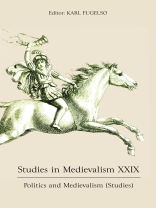Essays on the post-modern reception and interpretation of the Middle Ages,
To attract followers many professional politicians, as well as other political actors, ground their biases in (supposedly) medieval beliefs, align themselves with medieval heroes, or condemn their enemies as medieval barbarians. The essays in the first part of this volume directly examine some of the many forms such medievalism can take, including the invocation of 'blood libels’ in American politics; Vladimir Putin’s self-comparisons to 'Saint Equal-of-the-Apostles Prince Vladimir’; alt-right references to medieval Christian battles with Moslems; nativist Brexit allusions to the Middle Ages; and, in the 2019 film
The Kid Who Would be King, director Joe Cornish’s call for Arthurian leadership through Brexit. These essays thus inform, even as they are tested by, the subsequent papers, which touch on politics in the course of discussing the director Guy Ritchie’s erasure of Wales in the 2017 film
King Arthur: Legend of the Sword; medievalist alt-right attempts to turn one disenfranchised group against another; Jean-Paul Laurens’s 1880 condemnation of Napoleon III via a portrait of Honorius; Henry Wadsworth Longfellow’s extraordinarily wide range of medievalisms; the archaeology of Julian of Norwich’s anchorite cell; the influence of Julian on pity in J.K. Rowling’s Harry Potter book series; the origins of introductory maps for medievalist narratives; self-reflexive medievalism in a television episode of
Doctor Who; and sonic medievalism in fantasy video games.
Contributors: Laura Cochrane, James Cook, Esther Cuenca, Andrew B.R. Elliott, Ali Frauman, John Wyatt Greenlee, Sean Griffin, Christopher Jensen, M.J. Toswell, Laura Varnam, Usha Vishnuvajjala, Anna Fore Waymack, Daniel Wollenberg, Victoria Yuskaitis
Spis treści
Preface – Karl Fugelso
I: Essays on Politics and Medievalism (Studies)
Historical Malapropism and the Medieval Blood Libel in American Politics – Esther Cuenca
Putin’s Medieval Weapons in the War against Ukraine – Sean Griffin
The Battle of Tours and the US Southern Border – Daniel Wollenberg
Medievalism, Brexit, and the Myth of Nations – Andrew B.R. Elliott
An Arthur for the Brexit Era: Joe Cornish’s
The Kid Who Would be King – Christopher Jensen
II: Other Responses to Medievalism
Angle-ing for Arthur: Erasing the Welsh in Guy Ritchie’s
King Arthur: Legend of the Sword – Mary Behrman
Chasing Freyja: Rape, Immigration, and the Medieval in Alt-Right Discourse – Ali Frauman
’Things painted on the coarse canvas’: Political Polemic in Jean-Paul Laurens’s Portrait of the Child Emperor Honorius – Laura E. Cochrane
Longfellow and Old English – Jane Toswell
Archaeology and Medievalism at Julian of Norwich’s Anchorite Cell – Victoria Yuskaitis
A Revelation of Love: Christianity, Julian of Norwich, and Medieval Pity in the Harry Potter Series – Laura Varnam
In the Beginning Was the Word: How Medieval Text Became Fantasy Maps – Anna Fore Waymack and John Wyatt Greenlee
Objectivity, Impossibility, and Laughter in Doctor Who’s 'Robot of Sherwood’ – Usha Vishnuvajjala
Sonic Medievalism, World Building, and Cultural Identity in Fantasy Video Games – James Cook
O autorze
M.J. TOSWELL is a Professor at the University of Western Ontario.












